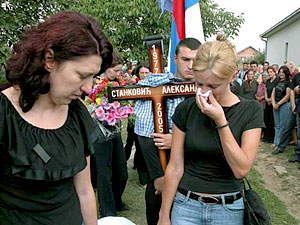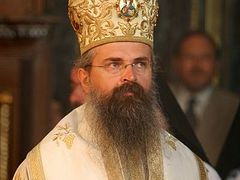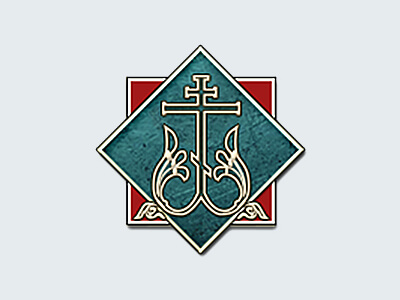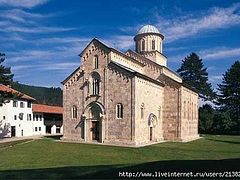Belgrade, Serbia and Montenegro
 Funeral of Aleksandar Stankovic in Livadje, near Pristina. Funeral of Aleksandar Stankovic in Livadje, near Pristina. |
| Funeral of Aleksandar Stankovic in Livadje, near Pristina. |
Serbs are murdered as the international community, local Serbs, Albanians and Belgrade clash over decentralization plans.
The brutal murder of two Serb young men and the wounding of two others on 27 August in southern Kosovo has highlighted the lack of progress in decentralizing the province, a process seen by Kosovo Serbs as key for their survival in the Albanian-dominated province.
The process remains at a standstill only weeks before the UN secretary-general’s special envoy, Kai Eide, is due to present his evaluation report on whether Kosovo has made enough progress for talks on its future status to begin.
Aleksandar Stankovic and Ivan Dejanovic were killed in the evening of 27 August on the road leading to the Serb-populated enclave of Strpce in the south of the province. Two of their friends were wounded in the attack.
Unknown gunmen first fired into the victims’ car tire, and then opened fire on the four Serb men as they got out of the vehicle.
For Kosovo Serbs, the slaying is further proof of the dangers they face as a minority in the province.
A local police investigation has yielded no results so far.
The killing represents one of the most serious incidents in Kosovo since March 2004, when anti-Serb violence broke out throughout the province, leaving dozens killed, hundreds wounded, 4,000 Serbs displaced and 800 of their homes burned or destroyed. Many Serb religious buildings were damaged or destroyed.
The scope and nature of violence then led Kosovo Serb leaders and Belgrade to demand decentralization in the province as a key prerequisite for the security and sustainable development of the Kosovo Serb population, as well as for the return of some 220,000 Serbs who have been displaced from the province due to terror attacks, threats and other forms of violence by Albanian extremists since the retreat of Serbian forces from the province in June 1999.
Serbs and other non-Albanians see decentralization as a question of survival and argue they must be allowed to manage justice, police, health, culture, social and education affairs in parts of Kosovo where they live.
Ethnic Albanian politicians are reluctant to engage in the decentralization process, with opposition parties openly arguing that decentralization is a pro-Serb project that could lead to a "partition of Kosovo."
PLAN A, B, C.
Belgrade and Kosovo Serbs proposed a decentralization plan for the province in April 2004. The plan would have allowed for the creation of viable Serb municipalities in the province. Although it was subsequently rejected by the UN Mission in Kosovo (UNMIK) and the Kosovo Albanian leadership, the initiative put enough pressure on the international community to bring decentralization closer to the top of Kosovo agenda.
But instead of a comprehensive decentralization process for the entire province, as suggested by the Kosovo Serbs, the UNMIK and Kosovo’s own Ministry of Local Self-Government proposed this February a pilot program formula, involving only five municipalities - two Albanian (Djeneral Jankovic, Junik), two Serb (Gracanica, Partes) and one Turkish (Mamusa).
Minister of Local Self-Government Lufti Haziri described the scheme as an experiment, adding that it would last for 18 months.
Kosovo Serbs described it as a "decentralization in crumbs." Nevertheless, the Serbian List for Kosovo, a Serb coalition in the province, decided to participate in the working groups for the pilot projects.
However, even in the form of pilot projects, the decentralization process did not fly. The proposal, now known as Plan A, did not allow for Serbian villages neighboring Gracanica and Partes to join the scheme to create larger and thus more viable municipalities, Serb representatives say.
Vesna Jovanovic, a Serb member of the working group for the municipality of Partes, in eastern Kosovo, said the Serbs felt "duped by the Kosovo Albanian ministers and UNMIK" and argued that "the Kosovo government is simply avoiding starting the decentralization process."
The evaluation process led by the UN Special Envoy, Kai Eide, put pressure over the summer on Kosovo Albanians and UNMIK to revise this plan and propose a new one, allowing for the neighboring villages to join Gracanica and Partes.
In early August, the Kosovo government adopted a new plan, with Haziri arguing that Plan B represented progress over the first version. Haziri contends that the new plan takes Serbian objections into account and provides for more flexible boundaries.
But the Serbs argue Plan B contained a trick. While it allowed some Serb villages to join Gracanica and Partes, it also included large ethnic-Albanian villages in the project, thus undermining local the Serb majorities.
"The Serb community will not participate in this kind of pilot projects", Vesna Jovanovic told TOL.
Jovanovic, who is participating in the working group for her village of Partes, complains about the inclusion of a large Albanian-dominated village in what was nominally to become a Serb-majority municipality.
Under Plan B, the Serb villages of Pasjane and Donja Budriga would joint Partes, but also Cernica, today a largely ethnic-Albanian village.
According to Jovanovic, since 1999 seven Serbs have been killed in Cernica (including a four-year old girl), more than 30 were wounded, and dozens of Serb homes were blown up. Not a single Serb family dared to enroll a child in the first class of the local elementary school starting this September. The Serbs fear that, if Cernica joins the Partes pilot project, ethnic Albanians would soon outnumber them and control the municipality.
"In the past three months, Albanians from Cernica have bought large plots of land next to the main road and near the Serb villages. They have built waste depots only a couple of hundred meters from Partes," she says.
The Serbs argue that the Plan B would have consequences opposite to those originally intended - to allow a sustainable living space for the Kosovo Serbs.
"This kind of decentralization will directly make Serbs flee Kosovo and will kill off the last hope that things can get better," Jovanovic says.
Kosovo Albanian leaders, however, insist they only want to create multiethnic municipalities and avoid the creation of mono-ethnic Serb municipalities.
«CLEAR MAJORITIES NEEDED»
Slobodan Samardzic, an advisor on Kosovo to Serbia’s Prime Minister Vojislav Kostunica, argues that the Plan B is a "big nothing" and denounces the ethnic-Albanian argument.
"It is an absurd that the Albanians are now insisting so much on multiethnic municipalities after expelling more than 200,000 Serbs from Kosovo," he argues.
"The Albanians should not test multiethnicity at the level of municipalities but at the level of Kosovo as a whole. The way things are going, multiethnic municipalities would mean an ethnically pure Kosovo. The Serbs are not calling for ethnically pure municipalities, but municipalities that would allow for a clear Serb majority, meaning 70 or 80 percent Serb, as only that kind of proportion can guarantee security," Samardzic told TOL.
Unhappy with the Plan B, Kosovo Serbs proposed in late August what is now informally known as the Plan C.
According to Jovanovic, the Serbs are demanding "clear majorities" in Serb municipalities, more power for those municipalities and a precisely defined dynamic of transfer of power. Furthermore, they are calling for a larger number of Serb municipalities in the province and for the process of decentralization in the whole of Kosovo to be put in place before the next municipal elections take place in the fall of 2006.
According to Samardzic, this new plan is "rational" and calls for a larger number of municipalities in central Kosovo, the Pomoravlje region in the east, and the Metohija region in the West of the province.
The municipalities would be linked among themselves "horizontally," thus giving more weight to the Kosovo Serbs.
"Decentralization in Kosovo is not just a question of more efficient local self-government. It should also allow the survival and the return of the Kosovo Serb communities," Samardzic says.
During his visits to Kosovo this summer, Kai Eide has expressed dissatisfaction with the decentralization process. His report is expected in September and may determine whether future status talks can begin in the next couple of months. The Kosovo Albanians want the province to secede from Serbia, while the Kosovo Serbs and Belgrade refuse such an option, proposing a broad autonomy, but falling short of full independence.



